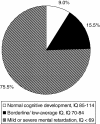Propionic acidemia: clinical course and outcome in 55 pediatric and adolescent patients
- PMID: 23305374
- PMCID: PMC3568723
- DOI: 10.1186/1750-1172-8-6
Propionic acidemia: clinical course and outcome in 55 pediatric and adolescent patients
Abstract
Background: Propionic acidemia is an inherited disorder caused by deficiency of propionyl-CoA carboxylase. Although it is one of the most frequent organic acidurias, information on the outcome of affected individuals is still limited.
Study design/methods: Clinical and outcome data of 55 patients with propionic acidemia from 16 European metabolic centers were evaluated retrospectively. 35 patients were diagnosed by selective metabolic screening while 20 patients were identified by newborn screening. Endocrine parameters and bone age were evaluated. In addition, IQ testing was performed and the patients' and their families' quality of life was assessed.
Results: The vast majority of patients (>85%) presented with metabolic decompensation in the neonatal period. Asymptomatic individuals were the exception. About three quarters of the study population was mentally retarded, median IQ was 55. Apart from neurologic symptoms, complications comprised hematologic abnormalities, cardiac diseases, feeding problems and impaired growth. Most patients considered their quality of life high. However, according to the parents' point of view psychic problems were four times more common in propionic acidemia patients than in healthy controls.
Conclusion: Our data show that the outcome of propionic acidemia is still unfavourable, in spite of improved clinical management. Many patients develop long-term complications affecting different organ systems. Impairment of neurocognitive development is of special concern. Nevertheless, self-assessment of quality of life of the patients and their parents yielded rather positive results.
Figures
References
Publication types
MeSH terms
LinkOut - more resources
Full Text Sources
Other Literature Sources
Medical


